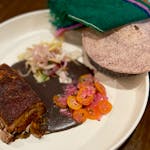Surly is brewing up something new.
Since 2006, the Minneapolis beer giant has led the way locally in experimentation and off-the-beaten-path brews. Now, Surly is adding gluten-reduced beers to its resume, becoming one of just two breweries in the state to do so.
Surly will be tapping the first of its two gluten-reduced beers for the first time on Wednesday – but many loyal patrons will already be familiar with what ends up in the pint glasses. The brewery started offering both Surly Pils and the Hopshifter IPA in its taproom about a year ago, but now Surly is changing up the process slightly, and yielding different results.
"We've been reducing the gluten in different beers for a while now," head brewer Ben Smith said. "But we were doing it for a different purpose."
That is, Smith and the other brewers were adding enzymes to some of Surly's beers in an attempt to reduce the haze – or cloudiness – that can affect taste and longevity.
As it turns out – and as other breweries around the nation have similarly discovered – the haze-inducing proteins targeted by those enzymes were the same proteins that cause issues for people with Celiac disease and other gluten sensitivities.
"It's just kind of a happy coincidence," Smith said.
So after several months of research, Surly decided to go the rest of the way and make a couple of its beers – Surly Pils and Hopshifter – safe for those with the greatest gluten sensitivities to drink. Surly Pils is available now, while Hopshifter will be beginning on Wednesday, March 22.
Traces of gluten still remain in both beers, but the amount is well below the legal standards necessary to label a product gluten-free. Surly can't, however, label the beers gluten-free because it incorporates barley in the initial brewing process.
The state's other gluten-free beers come from Burning Brothers Brewing, which is an entirely gluten-free brewery that makes its brews with gluten-free grains rather than gluten-extracted barley.
"We get questions every day from people who want to know if we have anything gluten-free or if we will," Smith said. "Having this technology and having used this process for a while, it just seemed like a no-brainer."
And here's the kicker: Smith and Co. say the beers taste exactly the same – or better, considering that the process greatly reduces the haze, lengthens the shelf life and stomps out proteins many consider detrimental to beer.
"It doesn't affect the flavor at all – that's the best part," Smith said. "If anything, it makes them better. You're getting a brighter beer that has a greater head retention and is gluten-reduced, all at the same time."
Riley Seitz, the quality assurance and quality control manager at Surly, said the brewery will test each batch of beer for gluten twice – first out of the tank and then again out of the taps, which will have dedicated gluten-free lines. Each tank at Surly's Brooklyn Park facility is thoroughly cleaned and sanitized with any new batch.
For now, the beers will be available only throughout the building (at Surly's Beer Hall, Brewer's Table and the Scheid Hall Event Center -- there are also plenty of gluten-free eats available on the menus.) Bottling requires additional testing and regulations; and allowing the beers on tap at other establishments creates the concern of contaminated tap lines. Eventually, Surly is interested in creating another gluten-reduced brew – something dark and malty, perhaps – and Smith said he believes he could use the same process with any of Surly's beers, without penalty of cost, time or taste. But for now, he and the others at Surly are seeing how the early releases are received.
"There really aren't any downsides to doing this" outside of the potential stigma from regular beer drinkers, Seitz said. "It doesn't really add onto the cost of the beer at all, and testing is really easy too."






